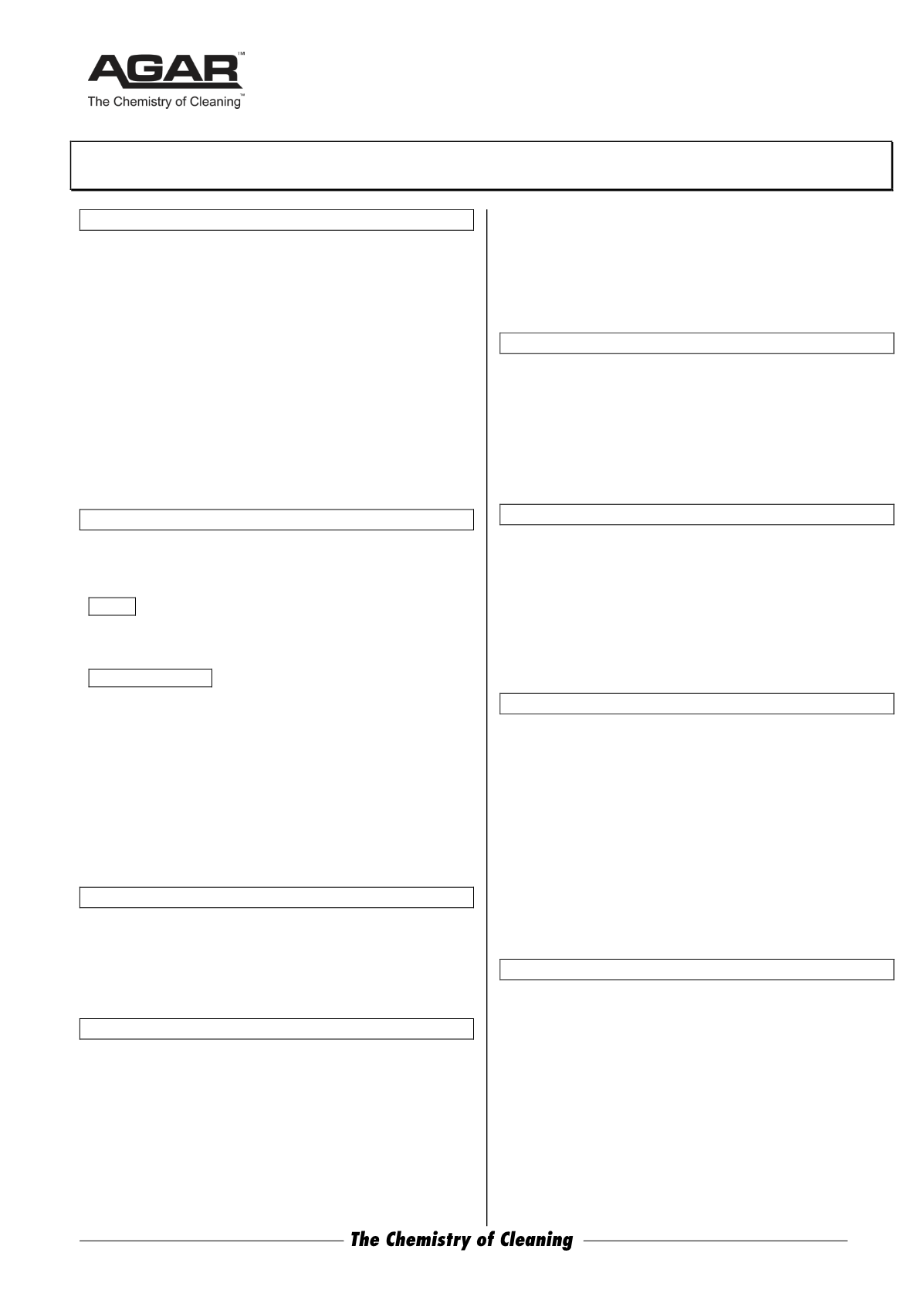

ABN 80 004 726 890 | MADE IN AUSTRALIA
VIC 03 9480 3000
NSW 02 9743 6020
SA 08 8293 2020
QLD 07 3274 3438
WA 08 9249 4566
Safety Data Sheet
Issued: June 1, 2014
Page 1 of 2
HOOK ACID
1 IDENTIFICATION OF THE MATERIAL AND SUPPLIER
Product Name:
HOOK ACID
Other Names: Corrosive Liquid, Acidic, Inorganic, N.O.S.
Manufacturer's Product Code: HOOA200
Product Use: Dissolving scale and rust from hard surfaces and
metal objects.
SUPPLIER DETAILS
Company: Agar Cleaning Systems Pty. Ltd.
Address: 12-14 Cope Street, Preston, Vic. 3072
Telephone: 03 9480 3000 Facsimile: 03 9480 5100
Web:
www.agar.com.auAgar SDS are available from this website.
E-mail:
sales@agar.com.auEmergency Telephone Number: 131 126
(Aust wide)
2 HAZARDS IDENTIFICATION
Hazardous according to criteria of Safe Work Australia.
Corrosive C. Classed as Dangerous Goods.
Risks:
Causes burns. [R34]
Safety Directions:
Keep locked up and out of the reach of children. [S1/2]
In case of contact with eyes, rinse immediately with
plenty of water and seek medical advice. [S26]
In case of accident or if you feel unwell, seek
medical advice immediately (show the label
whenever possible). [S45]
Hook Acid becomes non-hazardous at concentrations below
20%
3 COMPOSITION / INFORMATION ON INGREDIENTS
Ingredients:
Chemical Name: CAS No.: Proportion:
Phosphoric acid 7664-38-2 > 60%
Surfactants non-haz
< 10%
other non-haz ingredients and water to 100%
4 FIRST AID MEASURES
Poisons Information Centre: Phone 131 126
Swallowed:
If poisoning occurs, contact a doctor or Poisons
Information Centre. If swallowed, do NOT induce vomiting.
Give patient 1-2 glasses of water. Never give anything by
mouth to an unconscious person.
Eye:
Immediately hold the eyes open and wash continuously for
at least 15 minutes with fresh running water. Ensure irrigation
under eyelids by occasionally lifting the upper and lower lids.
Seek medical advice. Removal of contact lenses after an eye
injury should only be undertaken by skilled personnel.
Skin:
Remove any contaminated clothing, including footwear,
and flush area with water. Wash affected areas thoroughly
with mild soap and water. Seek medical attention in the event
of irritation.
Inhaled:
Remove patient to fresh air, rest patient and seek
medical advice. Give artificial respiration if breathing stops. If
breathing is difficult give oxygen.
5 FIRE FIGHTING MEASURES
Fire/Explosion Hazard: Hook Acid is not combustible.
Fire Extinguishing media: Use water fog, dry chemical, carbon
dioxide or foam.
Special fire-fighting procedures: None.
Unusual fire hazards: Hook Acid can react with certain metals to
produce flammable hydrogen gas.
Hazardous products of combustion: Thermal decomposition in a
large fires may yield phosphorus oxides.
6 ACCIDENTAL RELEASE MEASURES
Ventilate area well. Clean up all spills immediately. Avoid
contact with skin and eyes. Contain spill for salvage or absorb in
absorbent material such as lime. Neutralise with lime or soda
ash. Place in a suitable, labelled container for waste disposal. If
contamination of sewer or waterways has occurred, advise local
emergency services.
Other Information: If spilled on clothing, it should be removed
and laundered before re-use.
7 HANDLING AND STORAGE
Handling: Wear the correct personal protective equipment.
Avoid skin and eye contact.
Storage and Transport: Store in a cool, well ventilated place.
Store with all the precautions required for handling a corrosive
liquid. Observe State Regulations concerning the storage and
handling of Dangerous Goods.
Incompatibility (Materials to avoid for purposes of transport,
handling and storage only): Oxidising agents like liquid
chlorine, concentrated oxygen or sodium hypochlorite. Also
avoid bases, sulphides, cyanides, acetylides, fluorides,
silicides and carbides. Class 8 Dangerous Goods must not be
loaded with other Dangerous Goods of Classes 1, 4.3, 5.1,
5.2, 7 or 8 (alkalis only) or with foodstuffs.
8 EXPOSURE CONTROLS / PERSONAL PROTECTION
Exposure Standards: for ortho-phosphoric acid:
TWA = 1 mg/cu.m; STEL = 3 mg/cu.m
[Source: Safe Work Australia HSIS- 2014]
Engineering Controls: Ensure adequate ventilation to keep
exposure levels to a minimum.
Personal Protection: Overalls and protective boots.
Gloves – Impervious natural rubber, butyl rubber, nitrile or
PVC gloves should be worn.
Note: Resistance of glove materials can vary. Evaluate
resistance under conditions of use and maintain PPE
carefully.
Eye protection – Ensure an eye bath is available. Wear
chemical goggles/full faceshield.
Please turn to page 2.


















